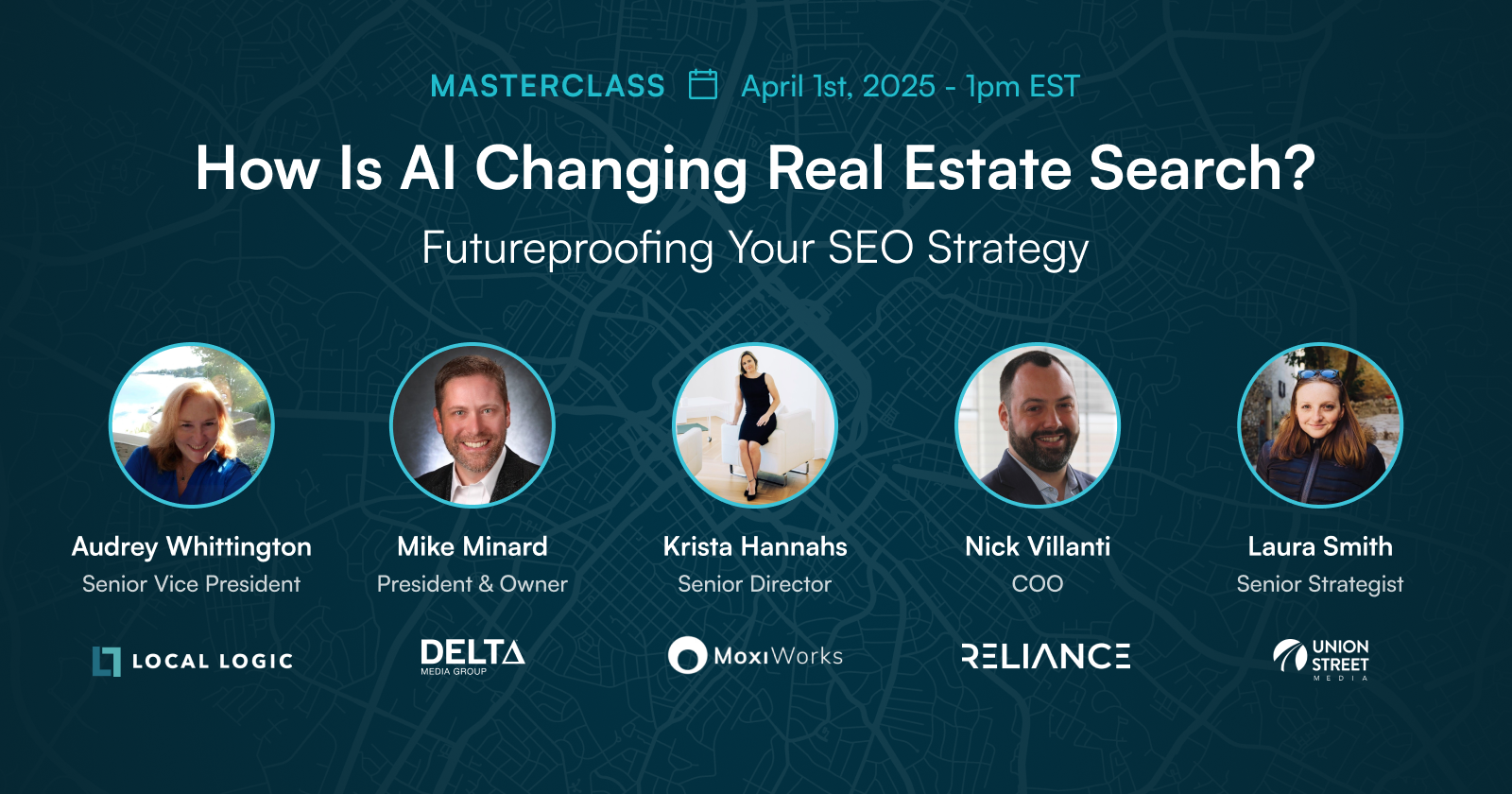Office Hours: What’s New in Home Consumer Engagement
Industry, Strategy
| 27 Aug 2025

For years, SEO and keyword-driven content have been the backbone of real estate websites. But times have changed. Zero-click content, AI-driven chatbots, and paid placements dominate search engine results pages (SERPs), leaving traditional SEO strategies struggling to capture organic traffic.
So, how do you stay ahead?
It’s time to rethink your SEO playbook and build a real estate website experience that attracts, engages, and converts homebuyers long before they’re ready to purchase.
Mike Minard (President & Owner, Delta Media Group), Krista Hannahs (Senior Director, MoxiWorks), Nick Villanti (COO, Reliance Network), and Laura Smith (Senior Strategist, Union Street Media) participated in a masterclass moderated by Audrey Whittington (Senior Vice President, Local Logic) to discuss how to ensure your website remains a powerful driver of business growth in this new era of real estate SEO.
In this masterclass, you’ll learn more about:
💡 Key takeaways:
AI refers to the ability of software to perform tasks that typically require human judgment, like pattern recognition, summarization, or prediction. In real estate SEO, this includes tools that generate content, identify keywords, analyze user behavior, and even help build marketing strategies. Platforms like ChatGPT, Perplexity, Claude, and Gemini each have strengths, but the core challenge is knowing how to use them purposefully rather than just experimenting.
AI is being used to write blog posts, automate listing descriptions, and support internal marketing decisions. It’s also helping teams build campaigns faster, especially when combined with strong prompts and editorial review. Importantly, not all AI tools are interchangeable — selecting the right model and understanding its data source and behavior is essential to get accurate results.
Many teams rely on ChatGPT for drafting content or brainstorming headlines, while others prefer Claude for coding or Gemini for integrating with Google tools. These models vary in their capabilities, and choosing the right one depends on the task, whether it’s generating copy, analyzing competitors, or assisting with SEO audits.
Rather than chasing trends, professionals are learning to ask better questions of these tools. For example, instead of asking an AI to “write a blog post about buying a home,” users get more valuable output by providing local context, clear goals, and audience details. Great input leads to great AI results. But those results still need human vetting to ensure factual accuracy and brand alignment.
Homebuyers increasingly use AI to explore early-stage questions about neighborhoods, schools, or lifestyle — before they ever land on a brokerage site. Traditional SEO still drives traffic for transactional searches like “homes for sale in Austin,” but AI is now answering the “why” and “where” questions that come earlier in the funnel.
This shift creates both a challenge and an opportunity. Websites that rank in AI results typically offer deep, structured content — like neighborhood guides, lifestyle comparisons, and Q&A sections. If your content helps consumers make sense of their options, you’re more likely to be cited by AI models. The growing popularity of zero-click search also means that visibility now depends on creating content that can stand on its own, even outside your website.
To win in search — whether traditional or AI-driven — companies need to optimize not just for keywords, but for context and clarity. This includes interlinking listing pages with local content, refreshing existing articles, and using structured formats like bullet points and FAQs. Websites that show expertise and trustworthiness consistently rank better, especially when their content is cited by external sources or linked across a branded ecosystem.
Beyond content creation, consistency in tone, accuracy in facts, and relevance to location all matter. Real estate professionals are also revisiting traditional marketing tactics like press releases, reputation building, and third-party citations to reinforce authority. Visibility in AI responses isn’t just about feeding content into a tool — it’s about proving you’re a trusted voice on the subject.
Fair housing rules, content bias, and misinformation are all real risks when using AI in real estate. Tools can hallucinate facts, introduce discriminatory language, or misrepresent neighborhoods. To mitigate that, most teams are building workflows where AI drafts content, but humans edit and approve it before publishing.
Professionals are also turning to enterprise versions of AI tools, which offer better data security and customization. Editorial policies now include disclaimers, accuracy checks, and content audits to make sure nothing goes live that could harm consumers or violate compliance standards. Speed should never come at the cost of trust.
AI is changing how consumers search, how content ranks, and how marketing teams operate. But it’s not a replacement for strategy. The real advantage comes from combining AI tools with expert judgment, thoughtful content, and ethical use of data. Real estate professionals who invest in trustworthy content, align their messaging with user intent, and embrace SEO fundamentals will stand out in an increasingly automated world.
Stay ahead of the curve with Local Logic’s Masterclass Series, where industry leaders tackle the most pressing topics shaping the future of real estate.
To dive deeper into this topic, feel free to connect with our expert panelists directly: